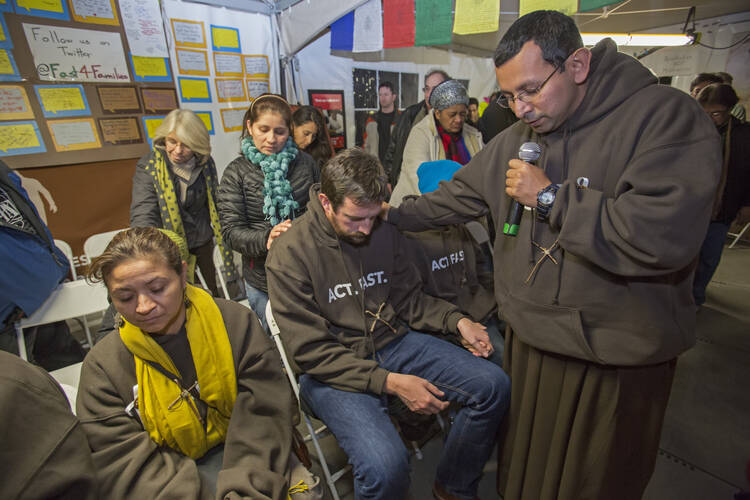January "hosts" the U.S.C.C.B.'s Poverty Awareness Month and National Migration Week, and two U.S. bishops led the charge in the press this week on themes related to these issues:. Philadelphia Archbishop Charles Chaput on immigration reform and Miami Archbishop Thomas Wenski on fixing the U.S. wage gap.
Archbishop Chaput takes Congress and both major U.S. political parties to task for the lack of progress in 2013 on immigration reform:
While the immigration debate in this country has burned on for years, Congress has consistently failed to pass adequate reform legislation. No single party bears the blame for the paralysis. Both Democrats and Republicans have misused this issue, and the powerful emotions it generates, for political gain. As a result, despite millions of words in partisan sloganeering, our national immigration policy still fails to address the complicated economic and social forces driving immigration.
Worse, this gridlock has very human consequences in the separation of children who are U.S. citizens from their non-citizen parents, and the wholesale alienation of immigrant communities.
As America’s bishops have stressed many times in the past, in the United States we now employ a permanent underclass of human beings who build our roads, pick our fruit, clean our hotel rooms and landscape our lawns. Most of these men and women, like millions of immigrants before them, simply want a better life for their children. They pay billions into our tax and Social Security systems. But even as we benefit from their labor, we too often do not offer them the basic protection of law. When convenient, we blame them for our social ills and pursue policies that intimidate them and their families.
Our immigration laws undergird this troubling status quo. Despite billions spent on enforcement each year, most unauthorized migrants find jobs once they arrive, or, in the case of visa overstays, remain in the United States. And while hundreds of thousands of these workers are added to our economy each year, only a fraction of that number in annual immigrant visas become available for people to enter our country legally.
He adds: "Congress can end these current policy and humanitarian failures by adopting a comprehensive immigration reform package. Any serious reform should provide a path to permanent residency for the undocumented already here, and create avenues for future workers and their families to enter the country legally." (Read the rest here.)
In the Florida Sun-Sentinal, Archbishop Wenski seized on the controversy surrounding some recent comments from the Vatican quote machine, Pope Francis, on economic exclusion, inequality and a "globalization of indifference" to make a case for raising the U.S. minimum wage:
[The words of Pope Francis] should provoke reflection—and lead to action—especially in the face of the challenges faced by low-wage workers in our economy today. This year, the minimum wage in Florida will rise to a paltry $7.93 an hour. This is hardly enough for a worker to support oneself, much less a family.
Many of the working poor, to avoid going hungry, must depend on the limited resources provided by parish food pantries or by government subsidies through various types of public assistance.
Some of these subsidies, like food stamps, have been rolled back, and none of them really help enhance the dignity of the worker. In many ways, these subsidies represent a type of "corporate welfare"—they benefit businesses and enable them not to pay their workers a living wage.
On the other hand, higher wages would reduce dependency on such subsidies, alleviate workers' economic insecurity and help economic recovery by enhancing spending.
Economic problems are complicated and there is no simple or single solution. But today in America, too many families are suffering under the weight of increasing moral, cultural and economic pressures.
Millions of young adults, unable to find decent work, are delaying marriage and starting a family, the "fundamental seed" of society necessary for human flourishing. Most distressing of it all is the loss of hope. Low-wage workers desperate for a fair shake are giving up hope of financial security. Too many parents are less hopeful that their children will grow up to enjoy a better life than they did.
Low wages that do not allow workers to earn enough to pay rent at the end of the month and to put enough food on the table for their kids leads to what the pope has also called "an economy of exclusion," stunting the lives of the poor for lack of opportunity.
Here's more on the U.S.C.C.B.'s position on immigration reform and about poverty in the USA.








